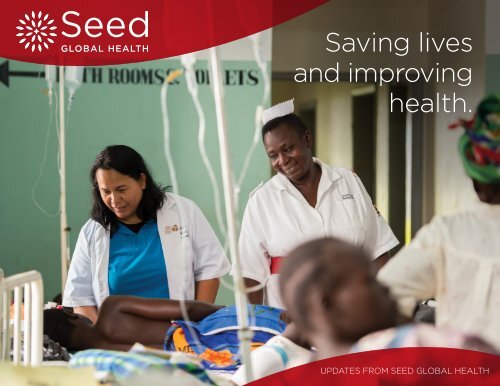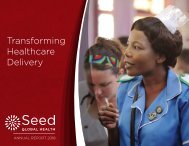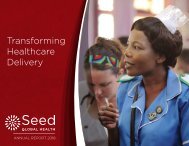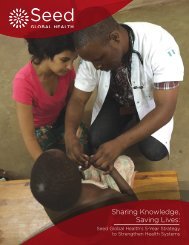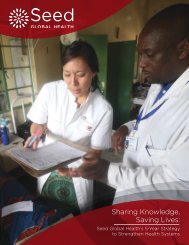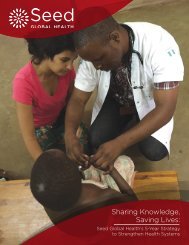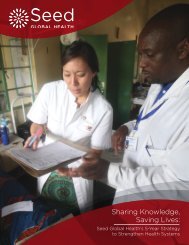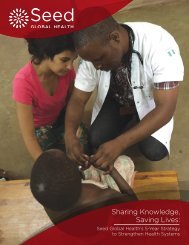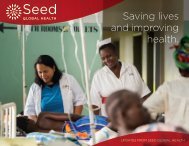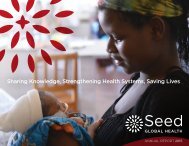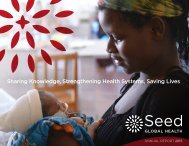Seed Updates and Reflections 2016
You also want an ePaper? Increase the reach of your titles
YUMPU automatically turns print PDFs into web optimized ePapers that Google loves.
Saving lives<br />
<strong>and</strong> improving<br />
health.<br />
UPDATES FROM SEED GLOBAL HEALTH
Our mission. Our model.<br />
Our impact.<br />
Skilled providers are the backbone of health care systems. Yet in 83 countries<br />
around the world, there is a dire shortage of trained health professionals <strong>and</strong><br />
this gap is slated to grow without meaningful intervention. In sub-Saharan<br />
Africa, there are only two doctors <strong>and</strong> ten nurses for every 10,000<br />
people, compared to more than 20 doctors <strong>and</strong> 90 nurses to serve<br />
the same number of people in the United States.<br />
Critically, these shortages contribute to two st<strong>and</strong>ards of health care in<br />
the world <strong>and</strong> for many that means dying of preventable <strong>and</strong> treatable<br />
diseases when they shouldn’t. At <strong>Seed</strong> Global Health, we believe every<br />
person deserves access to high-quality health care, every country<br />
should have a robust health workforce that is able to meet the needs of<br />
its population, <strong>and</strong> that well-trained health professionals are essential to<br />
achieving those goals. With these beliefs in mind, <strong>Seed</strong> Global Health supports<br />
<strong>and</strong> trains physicians, nurses, <strong>and</strong> midwives <strong>and</strong> to help improve health <strong>and</strong><br />
save lives in partner countries.<br />
We can not achieve such a goal without empowering the next generation of<br />
health professionals to serve as local providers <strong>and</strong> leaders in their communities.<br />
<strong>Seed</strong> places volunteer health professionals from the U.S. <strong>and</strong> other countries<br />
into medical <strong>and</strong> nursing institutions across five countries as faculty educators,<br />
helping to build the capacity of these future practitioners, <strong>and</strong> improve health<br />
outcomes in their clinics, communities, <strong>and</strong> country health systems.<br />
3 YEAR TOTALS:<br />
We do not do this alone. Working with local partners, we ensure that context<br />
<strong>and</strong> culture are deeply considered in everything we do, from curriculum development to clinical <strong>and</strong><br />
bedside teaching. And we do not do this in silos. We have offered 26 specialties since our inception,<br />
<strong>and</strong> are helping local institutional partners not only advance the development of their clinical specialties,<br />
but also integrate medical <strong>and</strong> nursing theory into evidence-based, patient-centered care.<br />
Read on to learn more about our activities this past year, <strong>and</strong> how we are working alongside partners<br />
in five countries to transform the future of local health systems.<br />
105 Volunteers<br />
454 Courses <strong>and</strong><br />
Trainings<br />
128,328 Service Hours<br />
8,321 Individuals Trained<br />
1 | <strong>Seed</strong> Global Health | <strong>Updates</strong> <strong>and</strong> <strong>Reflections</strong>
I have been taught that transitions – all kinds – are an opportunity. An opportunity to engage; an opportunity to mobilize; <strong>and</strong> an opportunity to<br />
believe we can have an impact if we choose. And in a period marked by global challenges – from refugee crises, to natural disasters, to significant<br />
elections around the globe – <strong>Seed</strong> Global Health is proud of the tremendous impact we have been able to achieve alongside our partners.<br />
We have completed our expansion to our two newest countries - Liberia <strong>and</strong> Swazil<strong>and</strong>. We have doubled the size of<br />
our program in our three founding countries – Malawi, Tanzania, <strong>and</strong> Ug<strong>and</strong>a. And we have partnered with 27 teaching<br />
institutions at 39 sites in five countries to train more than 13,000 physicians, nurses, midwives <strong>and</strong> clinical staff to date.<br />
Long-term health education <strong>and</strong> training in resource limited settings is essential for a strong health systems<br />
<strong>and</strong> improved health outcomes. <strong>Seed</strong> helped develop Malawi’s first Clinical Nurse Specialist position to ensure<br />
clinicalinstruction is provided to students on the ward so they can connect theory to practice <strong>and</strong> be mentored<br />
while inthe clinical setting. In Ug<strong>and</strong>a, <strong>Seed</strong> helped plan the first National Conference on antimicrobial resistance<br />
in thecountry, bringing together stakeholders from the World Health Organization, Ug<strong>and</strong>an Ministry of Health,<br />
Ug<strong>and</strong>an nursing <strong>and</strong> medical associations, <strong>and</strong> other partners for a critical discussion on preventing the<br />
unrecognized epidemic of antimicrobial resistance. <strong>Seed</strong> partnered with Tanzania’s government, Anesthesia Medical Society, largest<br />
medical school, <strong>and</strong> its largest public hospital to develop a robust plan to increase the number <strong>and</strong> quality of trained anesthesiologists<br />
in the country – there are an estimated 22 for a population of 44 million - to allow for safe <strong>and</strong> effective surgery.<br />
What continues to distinguish <strong>Seed</strong> is the depth <strong>and</strong> breadth of our work. We do not just provide essential care to vulnerable patients, but<br />
provide care with a commitment to nurture lasting change within the system. Different from a relief organization that brings in time-limited<br />
expertise in response to an urgent outbreak or natural catastrophe, we look toward long-term investment that empowers local leadersto<br />
respond in their own countries <strong>and</strong> context. We are not a research- focused academic institution with an agenda to generate discovery<br />
science <strong>and</strong> peer-reviewed papers, yet we empower critical thinking <strong>and</strong> curiosity of clinicians to ask important questions, improve quality<br />
of care, <strong>and</strong> change health outcomes for their patients.<br />
<strong>Seed</strong> is intentionally focused on capacity-building at the individual, institutional, <strong>and</strong> national level through sustained collaborative<br />
engagement with our partners. We build around the basic but essential belief that deep partnership can encourage local <strong>and</strong> systemic<br />
transformation, <strong>and</strong> that great improvement is possible with dedication, discipline <strong>and</strong> an investment of material <strong>and</strong> human resources.<br />
Our commitment to the enduring work of teaching, training <strong>and</strong> inspiring hundreds of local health care professionals has now garnered a<br />
global reputation. <strong>Seed</strong> has evaluated dozens of requests for partnership in recent years - evidencing the dem<strong>and</strong> for our unique model of<br />
engagement. We are constantly exploring ways to replicate <strong>and</strong> adapt our innovative partnership with new funding <strong>and</strong> local partners. We<br />
regularly examine new ideas beyond our core model, including partnerships that could support recruitment of health professionals globally<br />
or facilitate technology-based learning so as to bring <strong>Seed</strong>’s extensive evidence- based teaching modules to remote locations. <strong>Seed</strong>’s robust<br />
model <strong>and</strong> entrepreneurial spirit of engagement has the potential to exp<strong>and</strong> to myriad health specialties <strong>and</strong> fields as we move forward.<br />
We will continue to engage, to mobilize, <strong>and</strong> to believe that we can have an impact in the health <strong>and</strong> wellness of communities around the<br />
world, regardless of the challenges we face. <strong>Seed</strong>’s perseverance <strong>and</strong> growth would not be possible without your support <strong>and</strong> the unwavering<br />
commitments of our many partners. Our individual, foundation, corporate, institutional, <strong>and</strong> government partners remain instrumental in<br />
providing the necessary resources <strong>and</strong> support to achieve our mission. Together, we will scale <strong>and</strong> sustain this impact in the years ahead.<br />
Sincerely,<br />
Dr. Vanessa Kerry, MD, MSc<br />
Chief Executive Officer <strong>and</strong> Co-Founder<br />
2 | <strong>Seed</strong> Global Health | <strong>Updates</strong> <strong>and</strong> <strong>Reflections</strong>
Stories from the Field:<br />
Malawi: Patient Centered Improvements<br />
Mindy Weschler, a Nurse Educator in northwest Malawi, grew concerned when she noticed<br />
that her students were caring for patients after<br />
surgeries with very little treatment for the pain they<br />
were experiencing. She witnessed patients undergoing<br />
painful dressing changes <strong>and</strong> basic procedures without<br />
medication, <strong>and</strong> it motivated her to help mobilize the<br />
students, faculty, <strong>and</strong> staff to address the basic human<br />
right to compassionate <strong>and</strong> dignified care.<br />
There were many reasons patients’ pain was going<br />
untreated. Students <strong>and</strong> clinicians had not been taught<br />
the complexity of pain or pain management, had cultural<br />
beliefs that often led them to accept or ignore pain,<br />
<strong>and</strong> did not have the tools to manage it. As well, the<br />
hospital’s system for safeguarding <strong>and</strong> managing pain medications<br />
made it difficult for staff to even access medications. Patients were<br />
accustomed to just bearing pain without complaint.<br />
Mindy helped mobilized her students <strong>and</strong> her faculty <strong>and</strong> hospital<br />
colleagues to assess <strong>and</strong> treat pain management through a practice<br />
improvement initiative in this busy district hospital. Today the entire<br />
process for pain management is being conducted more effectively.<br />
Clinicians are actively assessing pain <strong>and</strong> using an evidence-based<br />
pain management protocol. The hospital agreed to redesign the<br />
procurement process for medications <strong>and</strong> made medications safely<br />
more accessible on the ward. Students are participating in the<br />
evaluation of the initiative. And, most importantly, patients are benefiting.<br />
MALAWI by the numbers<br />
11<br />
Volunteers<br />
5<br />
Sites<br />
14,653<br />
Service<br />
Hours<br />
64<br />
Courses<br />
2,913<br />
Individuals<br />
Trained<br />
3 | <strong>Seed</strong> Global Health | <strong>Updates</strong> <strong>and</strong> <strong>Reflections</strong>
Liberia: Caring for Fistula Patients<br />
Each year between 50,000 to 100,000 women worldwide are affected by obstetric fistulas, a<br />
hole created in the birth canal caused by prolonged labor without adequate medical intervention.<br />
Women who suffer from an obstetric fistula often lose their baby. In addition to the suffering from<br />
a lost child, they frequently are burdened with fecal <strong>and</strong> urinary incontinence <strong>and</strong> the painful<br />
humiliation <strong>and</strong> stigma that accompanies it. If left untreated, obstetric fistula can lead to chronic<br />
medical problems <strong>and</strong> even death, but surgery can normally repair the injury.<br />
Dr. Corrine (Cori) Maund had never encountered a case of<br />
obstetric fistula until she arrived in Liberia as a Physician<br />
Educator. During her time there, the hospital hosted a “ fistula<br />
campaign,” in partnership with visiting surgeons providing<br />
free surgery to women living with obstetric fistulas.<br />
“I have learned so much about fistulas since arriving in Liberia<br />
<strong>and</strong> as I learn I am reminded of the need for a strong healthcare<br />
system that can meet the needs of women,” says Cori. As she<br />
cared for the women recovering from surgery, she heard their<br />
painful stories of pregnancy <strong>and</strong> birth that lead to their injury.<br />
As Cori recalled, one her patients’, Garmai’s, baby died during<br />
her pregnancy. Garmai was left with a fistula the entire length of her anterior vaginal wall <strong>and</strong><br />
was uncontrollably leaking urine. She was ab<strong>and</strong>oned by all except her mother.<br />
Though Garmai had a difficult surgery to repair her fistula, it did not resolve her symptoms<br />
entirely. “I had to tell her that the surgery didn’t work, <strong>and</strong> she would need another,” explained<br />
Cori. “We cried together. It took her a long time to recover the hope she put into the surgery, but<br />
with love <strong>and</strong> support from her mother, her fellow fistula survivors, <strong>and</strong> me, she stayed positive<br />
<strong>and</strong> recovered well.”<br />
Underst<strong>and</strong>ing first h<strong>and</strong> that teaching <strong>and</strong> training the next generation of obstetricians <strong>and</strong> fistula<br />
surgeons is critical to the health of mothers <strong>and</strong> babies, Cori has remained in Liberia for a second<br />
year. She will continue to provide education <strong>and</strong> training to future health care providers, <strong>and</strong><br />
ensure more patients like Garmai get the care <strong>and</strong> treatment they deserve.<br />
LIBERIA by the numbers<br />
8<br />
Volunteers<br />
8<br />
Specialties<br />
2<br />
Academic Partner Sites<br />
4 | <strong>Seed</strong> Global Health | <strong>Updates</strong> <strong>and</strong> <strong>Reflections</strong>
Tanzania: Saving Infant Lives<br />
Almost 40,000 infants died in Tanzania in 2015, many whose deaths could have been<br />
prevented. Early detection of fetal distress is essential to improving chances of survival. By<br />
monitoring the fetal heart rate <strong>and</strong> identifying abnormalities early on, clinicians can intervene<br />
promptly, preventing potentially fatal complications such as birth asphyxia.<br />
Sengerema Designated District Hospital, located in the northern<br />
region of Tanzania, serves as a last referral hospital before patients<br />
are forcedto cross Lake Victoria to seek higher-level care. As a <strong>Seed</strong><br />
supported Physician Educator, Dr. Siobhan McCarty-Singleton saw<br />
how high patient volume <strong>and</strong> limited resources were contributing<br />
to high rates of neonatal mortality at the hospital.<br />
<strong>Seed</strong> Global Health provides basic material resources to supplement<br />
local equipment <strong>and</strong> supplies, aimed at improving targeted<br />
health interventions. Siobhan leveraged this support<br />
tointroduce an innovative new device, the Moyo Fetal Heart<br />
Rate Monitor. This simple device is designed to detect both<br />
the fetal <strong>and</strong> maternal heart rate in low-resource settings,<br />
providing those early indications<br />
of potential distress for baby <strong>and</strong><br />
mother. With this device in h<strong>and</strong>,<br />
hospital staff can make essential<br />
interventions to de-escalate any<br />
threats to maternal <strong>and</strong> newborn<br />
health.<br />
Empowered with the monitor, Siobhan organized accelerated<br />
trainings on the device for Sengerema District Hospital Labor<br />
<strong>and</strong> Delivery staff, nurses, <strong>and</strong> medical officers. Over three days,<br />
Siobhan trained staff on the proper use of the monitors <strong>and</strong> how<br />
to better diagnose fetal distress. Through Siobhan’s efforts, more<br />
local providers have both the equipment <strong>and</strong><br />
training necessary to ensure health of mothers <strong>and</strong> babies.<br />
TANZANIA by the numbers<br />
11<br />
Volunteers<br />
5<br />
Sites<br />
12,278<br />
Service<br />
Hours<br />
51<br />
Courses<br />
3,848<br />
Individuals<br />
Trained<br />
5 | <strong>Seed</strong> Global Health | <strong>Updates</strong> <strong>and</strong> <strong>Reflections</strong>
“They are all so knowledgeable.<br />
As teachers <strong>and</strong> mentors, they<br />
taught us the real nursing”<br />
– Rhamina, fourth year<br />
nursing student<br />
6 | <strong>Seed</strong> Global Health | <strong>Updates</strong> <strong>and</strong> <strong>Reflections</strong>
Ug<strong>and</strong>a: Accreditation for Nursing Program<br />
When Nurse Educators Genevieve Evenhouse <strong>and</strong> Janet Gross first arrived at Muni University in<br />
northern Ug<strong>and</strong>a, the nursing program at the school had just unexpectedly lost its accreditation<br />
fromthe Ug<strong>and</strong>an National Council of Higher Education. Motivated to restart the program <strong>and</strong><br />
get students into the classroom, Amos Drasiku, the Head of the Nursing Department at Muni,<br />
worked closely with Genevieve <strong>and</strong> Janet to get the school back on track.<br />
Together, they worked to regain program accreditation. First,<br />
they conducted a series of surveys with nurses at the local<br />
hospital to better underst<strong>and</strong> what were the educational needs of<br />
the community <strong>and</strong> the professional development opportunities<br />
for students <strong>and</strong> staff. “With our activities, it became imperative<br />
that we start relationship-building with community partners <strong>and</strong><br />
partners of Muni University,” said Genevieve.<br />
Second, in an outreach effort, the Muni team provided a<br />
one-day workshop to nurses from all clinical levels including<br />
from surrounding hospitals <strong>and</strong> local health centers. As Janet<br />
explained, “We’re trying to establish relationships that show that<br />
you can trust Muni, they’re going to give you the products <strong>and</strong> the services you need, <strong>and</strong> we<br />
are group of people who care about you. We’re hoping that they’ll see that <strong>and</strong> help us educate<br />
the Muni students.”<br />
After undergoing a comprehensive revitalization of infrastructure, the curriculum finalized, <strong>and</strong><br />
the labs <strong>and</strong> classrooms prepared, the National Council of Higher Education visited the University<br />
<strong>and</strong> the program received full accreditation. It is now the first program in the West Nile region of<br />
Ug<strong>and</strong>a to offer a Bachelor’s in Nursing degree. The establishment of the nursing program in the<br />
West Nile Region is all the more notable given how remote <strong>and</strong> rural the region is. “The launch of<br />
the program at Muni University is a much-awaited event here in West Nile,” said Genevieve. Since<br />
enrollment has opened earlier this year, they have received an impressive number of applications<br />
including from the local hospital <strong>and</strong> health center nurses who hope to earn their Bachelor’s <strong>and</strong><br />
go on to become the future health care leaders in their communities.<br />
UGANDA by the numbers<br />
10<br />
Volunteers<br />
5<br />
Sites<br />
15,785<br />
Service<br />
Hours<br />
38<br />
Courses<br />
1,560<br />
Unique<br />
Trainees<br />
7 | <strong>Seed</strong> Global Health | <strong>Updates</strong> <strong>and</strong> <strong>Reflections</strong>
“With our activities, it became<br />
imperative that we start relationshipbuilding<br />
with community partners<br />
<strong>and</strong> partners of Muni University.”<br />
– Genevieve Evenhouse<br />
8 | <strong>Seed</strong> Global Health | <strong>Updates</strong> <strong>and</strong> <strong>Reflections</strong>
9 |<br />
Swazil<strong>and</strong>: Combating HIV Stigma<br />
Swazil<strong>and</strong> has the world’s highest estimated rate of HIV, with upwards of 28% of adults infected.<br />
The disease has had a devastating effect on the country, stunting the economy, overwhelming<br />
the health system, <strong>and</strong> exacerbating other challenges including poverty <strong>and</strong> gender inequality.<br />
Supporting efforts to combat the disease, all students at the University of Swazil<strong>and</strong> are required<br />
to complete courses focused on HIV. This year, Nurse Educator Catherine Dell was assigned to<br />
teach an introductory course. She noted “The university is making HIV prevention a priority for<br />
these students who are demographically especially vulnerable.”<br />
Working alongside a local faculty member, Catherine was supposed to teach about HIV<br />
stigma <strong>and</strong> discrimination. Though she worried she could not adequately teach the depth <strong>and</strong><br />
complexity of the subject given she does not personally live with a diagnosis of HIV, Catherine<br />
was dedicated to seeing that her students learned about the reality of living with the disease in<br />
Swazil<strong>and</strong>. To facilitate, she hoped to invite an HIV+ guest speaker to work with her class. This<br />
idea proved easier said than done. She quickly learned that it is nearly impossible to find people<br />
willing to openly disclose their HIV status in Swazil<strong>and</strong> because of stigma. For Catherine, her<br />
planned lesson became all the more essential.<br />
Catherine’s finally found Vusi, the National Coordinator of the Swazil<strong>and</strong> AIDS Support<br />
Organization, the country’s first HIV advocacy organization. In a country with very few HIV<br />
advocacy or support groups, nearly 400 students gathered to hear from him, one of the first<br />
HIV+ individuals to disclose his status.<br />
“He was an extremely engaging <strong>and</strong> c<strong>and</strong>id speaker,” notes Catherine. “He was a comm<strong>and</strong>ing<br />
presence <strong>and</strong> led a lively discussion with the students about his journey living with HIV, a feat<br />
not easily accomplished in a hot, cramped auditorium. We planned on him speaking for an hour,<br />
but the students had so many questions for him, he actually spoke for two hours.”<br />
Catherine later asked students for their thoughts on the visit. “Their responses are<br />
overwhelmingly positive,” she reflects. “Many wrote about how their perception of HIV has<br />
changed since seeing that you can have a normal healthy life, <strong>and</strong> that you can even get married<br />
<strong>and</strong> have a healthy child as Vusi demonstrated. Several said they now understood the<br />
SWAZILAND by the numbers<br />
6<br />
Volunteers<br />
4<br />
Nursing Specialties<br />
2<br />
Academic Partner Sites<br />
9 | <strong>Seed</strong> Global Health | <strong>Updates</strong> <strong>and</strong> <strong>Reflections</strong>
importance of knowing your status <strong>and</strong> some<br />
wrote that they got HIV testing following the<br />
session. There were even some (I’m assuming)<br />
HIV+ students that wrote that they feel less<br />
depressed about their status.”<br />
As Catherine<br />
explains, “I<br />
really got the<br />
sense that<br />
the students<br />
no longer<br />
thought of HIV<br />
as ‘someone<br />
else’s problem.’<br />
I think they<br />
recognized that<br />
Swazil<strong>and</strong>’s HIV<br />
‘problem’ does<br />
not solely lie<br />
with the infected. Rather, HIV affects the<br />
whole community, <strong>and</strong> everyone has a duty to<br />
protect themselves <strong>and</strong> support each other”<br />
Now Catherine <strong>and</strong> her colleagues are<br />
working on bringing Vusi to share his story<br />
to all the HIV courses in the University.<br />
“In a country where HIV is so heavily<br />
stigmatized, I think Vusi’s contribution to<br />
this course was very transformative for<br />
the students,” said Catherine. “I truly<br />
believe this one class will have a profound<br />
impact on the students lives <strong>and</strong> leave<br />
a lasting impression on their perception<br />
of HIV in their community.”<br />
10 | <strong>Seed</strong> Global Health | <strong>Updates</strong> <strong>and</strong> <strong>Reflections</strong>
Make a donation | Spread the word | Join the effort<br />
20 Ashburton Place, 6 th Floor<br />
Boston MA 02108<br />
seedglobalhealth.org


